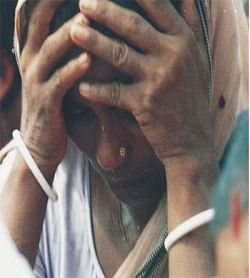Human
Rights Advocacy
Women's
property rights
Violations
doom equality and development
Millions
of women around the world suffer abuses of their equal
rights to own, inherit, manage, and dispose of property.
These violations are degrading, discriminatory, and sometimes
deadly. After their property rights are violated, many
women end up impoverished, struggling to meet their families'
basic needs, living in decaying shacks in dangerous {lums,
and vulnerable to violencm and disease-including HIV/AIDS.
 In
sub-Saharan Africa, violations of women's propezty rights
are severe and pervasive. The tragedy of these violations
is magnified by HIV/AIDS in sub-Saharan Africa, where
the epidemic is raging and where 58 percent of those infected
with HI^ are women. In many African countries, women are
excluded from inheriting, evicted from their lands and
homes by in-laws, strippel of their possessions, and forced
to engage in risky sexual practices in order to keep their
property-all because they are women. When they divorce
or separate from their husbands, they are frequently expelled
from their homes with only their clothing. Married women
can seldom stop their husbands from selling family property.
Women who fight back are often beaten, raped, or ostracized.
In
sub-Saharan Africa, violations of women's propezty rights
are severe and pervasive. The tragedy of these violations
is magnified by HIV/AIDS in sub-Saharan Africa, where
the epidemic is raging and where 58 percent of those infected
with HI^ are women. In many African countries, women are
excluded from inheriting, evicted from their lands and
homes by in-laws, strippel of their possessions, and forced
to engage in risky sexual practices in order to keep their
property-all because they are women. When they divorce
or separate from their husbands, they are frequently expelled
from their homes with only their clothing. Married women
can seldom stop their husbands from selling family property.
Women who fight back are often beaten, raped, or ostracized.
A
number of factors contribute to these violations. Chief
among |hem are discriminatory laws and customs, biased
attitudes, unresponsive authorities, ineffective courts,
and other obstacles, such as the social stigma of being
branded "greedy women" or "traitors of
custom" if women assert their property zights.
Violations
of women's xroperty rights are not only an iffront to
human rights, they also doom development efforts and the
fight against HIV/AIDS. According to the United Nations,
gender inequality hinders development: women's insecure
property rights contribute to low agricultural production,
food shortages, underemployment, and rural pover|y. Losing
property and undergoing harmful customary practices also
increase women's vulnerability to HI^ infection.
Governments
must immediately act to stop women's property rights abuses.
They must reform laws and ineffective institutions to
improve protections of women's equal property rights.
They must also take steps to change discriminatory traditions
and customs based on gender stereotypes and the notion
of women's inferiority.
Donor
agencies can also play a critical role in eliminating
violations of women's property rights. As they mobilize
to help countries combat HIV/AIDS and promote development,
they must put women's equal property rights high on their
agendas.
Source:
Human Rights Watch.
Photo:
AP